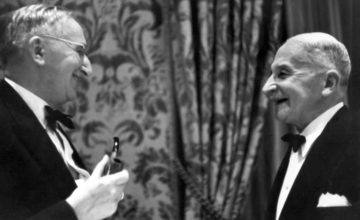 Quinn Slobodian in Democracy:
Quinn Slobodian in Democracy:
In early 2018, Larry Kramer, the dean of Stanford Law School and the president of the William and Flora Hewlett Foundation, which held assets of about $10 billion and disbursed around $400 million a year in grants, wrote a memo to the foundation’s board with a plan to end neoliberalism. Across 26 pages, he laid out a theory of recent U.S. history. By his account, the last four decades had seen the steady rise to dominance of a philosophy that operated around three interconnected beliefs: Society was composed of individuals seeking to maximize their own utility, progress was measured in metrics of monetary wealth, and the role of government was to enable markets to operate as freely as possible. The philosophy was incubated by a small group of intellectuals including Milton Friedman and Friedrich Hayek, who carried out a breathtaking victory march from the margins in the early postwar years of social democracy and Keynesianism to the center of American political consciousness. By the 1980s and 1990s, neoliberalism reached into every field of human endeavor from higher education to public policy. Kramer noted that philanthropy had played a major role in the success of neoliberalism, from the William Volker Fund to the Olin Foundation to the Koch Network. He proposed something radical to the board of the philanthropic body he directed: The Hewlett Foundation should take this history and flip it, reverse-engineer the neoliberal project and replace it with a new economic paradigm.
More here.
